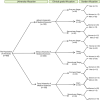Emotional intelligence and happiness in clinical medical students: A cross-sectional multicenter study
- PMID: 38078302
- PMCID: PMC10709659
- DOI: 10.1002/hsr2.1745
Emotional intelligence and happiness in clinical medical students: A cross-sectional multicenter study
Abstract
Background and aims: Emotional intelligence (EI) has improved job performance and has been associated with the success of individuals. The interfering role of happiness in this equation is unneglectable; however, this association has not been established in clinical medical students exposed to work pressures and stressful hospital atmospheric. The present perusal was conducted to evaluate the relationship between EI and happiness in clinical medical students.
Methods: A multicenter cross-sectional investigation was conducted in Iran from December 2021 to June 2022. Multi-stage cluster sampling followed by a systematic random selection was applied to choose participants. Data gathering was carried out online by Brief Emotional Intelligence Scale-10 and Oxford Happiness Questionnaire.
Results: Data from 405 participants were analyzed. The mean age was 24.2 years; men and women constituted 208 (51.4%) and 197 (48.6%) of all participants. Gamma regression analysis has determined age (Exp (B) = 1.016, p-value < 0.001), female gender (Exp (B) = 0.966, p-value = 0.04), extrovert personality (Exp (B) = 1.076, p-value < 0.001), perceived somatic health (Exp (B) = 1.002, p-value < 0.001), and stress level (Exp (B) = 0.990, p-value = 0.01) as predictors of happiness. EI comprises five domains, and except for appraisal of others' emotions, an increase in all other domains of emotional intelligence was associated with higher happiness. GBRT model of significant variables revealed regulation of own emotions is the most happiness-predictor variable (Exp (B) = 1.042, p-value < 0.001).
Conclusion: Diminishing the stresses helps medical students have a happier life. In happiness-boosting strategies, vulnerable individuals (women, introverts, and those of higher age) ought to be noted as the targeted population. In this investigation, emotional intelligence was the most effective predictor of happiness in clinical medical students. Planning to promote happiness in these medical staff by enhancing their EI leads to better decision-making and more prosperity in their job, resulting in better patient care services.
Keywords: COVID‐19 pandemic; burnout; depersonalization; emotional intelligence; extraversion; happiness; medical student; perceived stress.
© 2023 The Authors. Health Science Reports published by Wiley Periodicals LLC.
Figures



References
-
- Salovey P, Mayer JD. Emotional intelligence. Imagin Cogn Personality. 1990;9(3):185‐211. - PubMed
LinkOut - more resources
Full Text Sources

